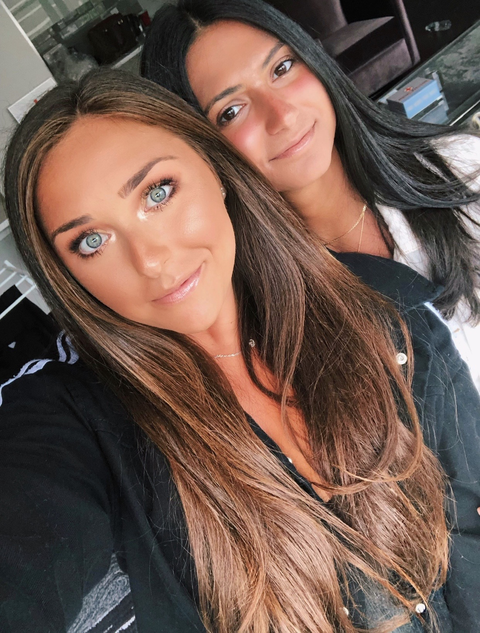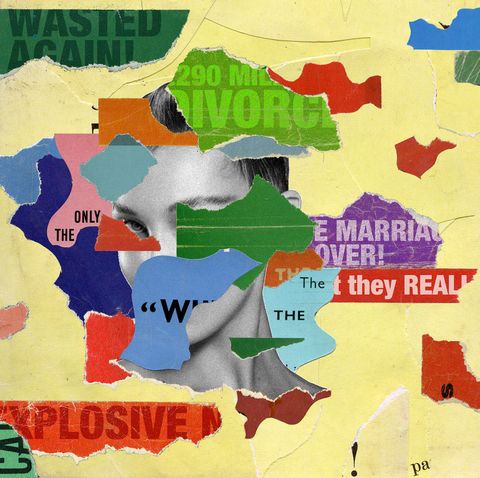
Comments By Celebs And Deux Moi Interview
On 18 March 2020, as the world teetered on the verge of lockdown, supermarket shelves were stripped bare and panic swirled and grew like a tornado, 26-year-old Emma Diamond sat nervously in her New York apartment, glued to her phone. But she wasn’t following news from Wuhan. Her two thumbs hovered over her screen, waiting. She took a deep breath to steady her mounting nerves. Across town, her best friend Julie Kramer was also at home, phone in hand, poised, ready to jump just as soon as what they knew was inevitable finally happened. They knew they’d have to act fast.
A few days before, they had seen grainy paparazzi photos of rumoured celebrity couple Ben Affleck and Ana de Armas on holiday together. It looked as if they were exploring a beach in the giddy haze of a new relationship, Affleck had his camera in his hand, capturing his co-star-turned-lover. Sure enough, de Armas later shared an image on Instagram, the sunset adding a natural sepia filter, her windswept hair caressing her shoulders against a beautiful beach backdrop.
But gossip-hunters Kramer and Diamond wanted proof that not only was she there with Affleck, but that they were more than just friends. In a scene that could have been straight out of Line of Duty, if the detectives were pop culture-obsessed Gen-Zers out to catch loved-up celebs rather crooked coppers, the pair pieced together the clues: comparing de Armas’ dress, location and hairstyle in the paparazzi pictures and on Instagram. They bookmarked her post and began their digital stakeout.
Hours later, they had what they needed, and they had it first. Affleck – a virtual stranger to Instagram – fell into the trap of the 21st-century boyfriend by flirtatiously commenting on his new love’s post: ‘Photo credit pls’ and a laughing face emoji. Feeling a wild hit of adrenaline, Diamond screengrabbed the comment, and Kramer wrote the caption – ‘There we go’ – before posting it to their Instagram account @commentsbycelebs. Thanks to their tenacity and patience, they became the first outlet to confirm this new celebrity coupling, beating esteemed news websites armed with a team of reporters in the process.
It’s a new kind of journalism – but then it’s a new kind of gossip. Everything Comments By Celebs posts to its 1.7 million followers has been generated by the celebrities themselves. The account just brings it all together. And indeed, when I talk to them over Zoom, Kramer attributes much of the account’s rise in popularity since the college friends founded it in 2018 to the simplicity of the model. But the real reason behind its success is that it so brilliantly solves the dichotomy of our addiction to gossip and our awareness that it’s not always benign for the person at the centre of it. Rather than secretly scanning the Daily Mail’s sidebar of shame, hating ourselves for consuming pernicious and unkind ‘news’ about our favourite stars, we can openly enjoy gossip. It is not mean, dark or seedily acquired – it’s an insider glimpse approved by the celebrities themselves. It’s fun and refreshing.
‘What we post feels a little voyeuristic, but with permission,’ Diamond explains. ‘You’re allowed to be viewing it. It’s not invasive. Knowing it’s what a celebrity has put out for the public automatically takes away the intrusiveness.’ Fans get to consume the content and celebrities finally get to be in on the joke. And the increased appetite for laughing with celebrities instead of at them has paved the way for this new era of ‘kind’ gossip. Celebrities who have been notably burned by gossip in the past – such as Jennifer Aniston and Gwyneth Paltrow – clearly approve, having followed and interacted with Comments By Celebs.
The popularity of the account – and others like it – rides a wave of reckoning over the harm that celebrity gossip has caused over the past 30 years. Of course there’s always been celebrity news, but for decades it was largely managed by interconnected groups of publicists, editors and journalists. The arrival of weekly gossip magazine Heat in 1999 lit a flame that became a full-blown inferno when the internet age dawned and the world went online. This was the era of Perez Hilton and his vindictive, cruel and utterly addictive blog; of TMZ posting police photographs of Rihanna’s bruised and beaten face after she was attacked by her then- boyfriend Chris Brown, breaking one of the biggest stories of 2009, and completely ignoring Rihanna’s right to privacy. The gossip industry went into overdrive, with new and old media competing viciously for the biggest stories and the fastest responses. Is it any wonder that in 2005 we found out through the phone-hacking scandal that the stories we relished about Sienna Miller and Jude Law, Hugh Grant and even Prince William were the result of illegal intrusion? Since then, celebrities at the epicentre of the celebrity gossip boom of the late Nineties and early Noughties – Paris Hilton, Emma Watson, Keira Knightley – have all described how awful it was. Just this year, documentaries chronicling the cruel harassment that Britney Spears was subjected to by the paparazzi as she declined into a mental health crisis have reminded us that gossip is not harmless fun.
So we don’t want to see ‘hoops of horror’ around the cellulite and stretch marks of female stars on the cover of celebrity weeklies any more, or for the flatness of Jennifer Aniston’s stomach to be dissected on a daily basis to determine her fertility status. But we still want to know the gossip. The difference now is that there are boundaries.
Journalist Camilla Wright is one person well-placed to observe this transition. In 2000, as interest was peaking around Cheryl Cole, Billie Piper and Lily Allen, she co-founded PopBitch – one of the first celebrity showbiz newsletters. It arrived in clued-up entertainment industry folks’ inboxes on a weekly basis and contained the juiciest celebrity rumours written in a plain text format – said to be so that subscribers could read it at work without being detected. And its sources were good; it broke real stories (such as Madonna calling her son Rocco) and soon cemented itself as the ultimate insider news source.
‘The reason there is celebrity gossip is because people want to be famous and make a lot of money from it,’ says Wright. ‘For anyone who’s got something to sell – whether it’s an album or new film out – they’re very willing to put the stories out there and stimulate gossip. It’s not just a bad thing. [Gossip] is the grease, oil and wheels of all popular culture. But there are degrees of it, and types of it.
‘Now, you look back and gossip became quite invasive,’ she says. ‘You can see why it happened, everything was so new and the interest was there. But now readers could look on that as when everything went a bit over the line. A lot of people in the public eye have said how invasive and abusive some of their coverage was and I think that permeated into popular culture. The gossip you get now is a little less one-sided, and a bit softer.’
Diamond and Kramer founded Comments By Celebs at a time when society has largely evolved to have a better understanding of mental health, a better outlook on body image and a greater awareness of the complexities and historic aggressions surrounding race, sexuality and gender identity. Everyone has had to re-evaluate what is considered to be fair and appropriate, including celebrity media. ‘We absolutely love this sh*t,’ says Diamond. ‘We love celebrity gossip but I think there’s a way to do it kindly. I don’t think that gossip and kindness can’t coexist.’
The duo regularly ignore comments they know would produce a huge amount of engagement for their account, because they don’t feel morally comfortable sharing them – they face the ‘to post or not to post’ question so frequently they even have a term for it: Mourning Viral Content. They also have a ‘general rule of thumb’ not to post anything involving Chris Brown because of their personal views about him, and have chosen not to share headline-grabbing comments made by Lindsay Lohan or Kanye West, for example, given their well-documented struggles with addiction and mental health.
On their weekly podcast (‘one of the biggest components of our business’; their main source of revenue is advertising, both on the podcast and through sponsored comments across their Instagram platforms) they’re similarly thoughtful. They caveat less-favourable opinions with non-judgemental disclaimers, have a weekly shout-out to Black-owned businesses, and one of its sponsors is an organisation providing virtual therapy. They have expanded Comments By Celebs with sister accounts such as Overheard Celebs, which shares follower’s fan encounters with celebrities, sent to them via direct message. The account’s bio describes Overheard Celebs as ‘An Anti-Gossip journal’. The posts are overwhelmingly positive, such as Sophie Turner joining a girl on stage at a karaoke bar to rap to an Eminem song, or Meghan Markle leaving a handwritten note for a retail worker in her pre-royal days. Any negative stories sent in are not published. ‘We are too sensitive,’ says Diamond. ‘We’re too concerned with not wanting to hurt anyone or invade anyone’s privacy. I think it would just weigh too much on us.’
This content is imported from Instagram. You may be able to find the same content in another format, or you may be able to find more information, at their web site.
Social awareness might be the force behind the change in gossip culture, but it’s a technological innovation – social media – that’s made it possible. For celebrities, it’s a double-edged sword: any picture or video of them can go viral in an instant. But it’s also a way for them to talk directly to their fans; they don’t have to deal with journalists or pose for paparazzi to ensure there’s a steady stream of stories about them in the media. They just need to update their own Instagram feed, a channel where they’re completely in control.
Showbiz journalist Kelly Allen started her career on the UK tabloid circuit in the early 2000s, where one of her first jobs was working on the Daily Mirror’s infamous 3AM celebrity gossip column. She describes the transition. ‘Celebrities used to go out and you’d have access to them,’ she says. ‘There were no camera phones or social media. We used to go to this club Punk on London’s Wardour Street on Thursday nights and everyone would be there. I met Lady Gaga, Paris Hilton, the Olsen twins, Lily Allen, Nick Grimshaw, Kate Moss. You would see things happen. Celebrities would get really drunk and fall over. One night I was there and a celebrity actually hit a journalist.’
Now, Allen says, self-aware stars are in control, noting that ‘younger celebrities in particular’ appear suspicious of journalists. ‘Back then, they didn’t care,’ says Allen. ‘Because it was a way of being in the papers, which was much more important.’
Social media is also the fuel in the fire of another hugely popular ‘soft’ celebrity gossip Instagram, @deuxmoi, which accumulated more than 980,000 Instagram followers over the pandemic. Its creator is a woman who – perhaps ironically – wants to be kept anonymous. She won’t tell me who she is or anything about herself or the @deuxmoi team (or even if there is a team). All I know from our Zoom audio link is that she’s based in New York City.
With 45,000 followers from an existing lifestyle blog, in spring 2020, @deuxmoi asked her followers to send in their personal encounters with celebrities. ‘I’m sure people were in the same position as I was, they were at home and bored, they saw the post and wrote in. That’s honestly how it started.’
Now, she fields around 100 tips a day. Followers write in with a celebrity sighting, interaction or rumour. For the most speculative, salacious and unfavourable rumours, @deuxmoi redacts the name of the celebrity, which is known as a ‘blind’. Sometimes the tips are accurate (@deuxmoi was the first to suggest that Bridgerton’s Phoebe Dyenevor was dating Ariana Grande’s former fiancé Pete Davidson); sometimes tip-offs, such as Tracee Ellis Ross and Harry Styles sighted at dinner together, lead to rumours that turn out to be completely false. @deuxmoi shrugs this off. She stresses repeatedly in her posts and in her bio that incoming tips are not verified; the account is merely a platform for other people’s speculation and amateur sleuthing into the lives of celebrities.
‘I’m totally fine with [rumours proving to be not true],’ she says. ‘I never said that Ellis Ross and Styles were dating, some people just pick stuff up and run with it. It was a sighting of them dining together… I mean, it’s pretty low stakes. If it’s refuted that somebody isn’t dating somebody else, that’s fine.’
Leaning towards ‘low stakes’ gossip is the justification @deuxmoi has for her foray into celebrity tattletaling. But, since the account has amassed more followers, she has tried to be more ‘responsible’ with its tips, taking time to consider a rumour and its effects, whereas before she admits she was ‘hasty’. Like Diamond and Kramer, she actively tries to share positive gossip: an April ‘celeb compliment circle’ feature included: ‘Hailey Bieber is extremely well-composed for the unnecessary hate she gets’, ‘George Clooney smells amazing in real life and is so nice’ and ‘Katy Perry is genuinely the nicest celebrity I’ve ever met, and I deal with them on a daily basis’.
Far from the days of threatening legal letters and late-night super-injunction battles, neither Comments By Celebs nor @deuxmoi puts up a fight when a celebrity gets in touch. @deuxmoi has had two different celebrities asking her to take down posts in recent weeks, though she declines to mention names. ‘[The account] is just for entertainment. But if somebody feels bad about something that’s posted about them and asks me to take it down, it immediately comes down.’
I get the impression that @deuxmoi isn’t sure what to make of her rapidly increasing follower count, and she certainly never expected celebrities to see the gossip she posts about them. She refers to the account as a ‘secret little society’ and enjoys the community-based back-and-forth DM relationship she has with tipsters, who are often the entertainment industry’s unsung heroes – housekeepers, drivers and receptionists. Knowing that celebrities have seen her posts has loosened the bricks on the fourth wall she’s assembled, which, honestly, she finds ‘kind of a bummer’.
It is important to @deuxmoi to not be ‘mean, snarky’ or ‘interject commentary’, she tells me, and I believe her. But I do wonder what a celebrity’s take might be: are the grainy photos she posts of celebrities ‘spotted’ walking their dogs or having a quiet dinner pushing at the boundaries of their privacy? A bad moment on a bad day becomes a tip-off shared with close to a million followers with no context or right of reply.
And what about rumours about celebrities’ sex lives published on the account? @deuxmoi has a clear line on this subject, she explains: ‘People want more. They ask, “Can you do a ranking of celebrity dick sizes?” No, I cannot… I share when people write in about their positive sexual experiences with celebrities. Some people think that’s crossing a line, but I think, Hey, good for the parties involved, sounds like it was a great time.’
But, while social media has allowed for a more relatable side to celebrity, and sated our innate desire to know about the private lives of stars, it has also produced echoes of the mean-spirited gossip we saw thrive in the Noughties. There’s an underbelly of ruthless trolling, unchecked fan accounts dedicated to ‘taking down’ other celebrities, and websites such as Tattle Life, which have dedicated forums to browbeating influencers and celebrities such as Meghan Markle (whose decision to step down as a senior member of the royal family has largely been attributed to the abuse and harassment she faced from the press and public) and Sophie Hinchcliffe (Instagram cleaning guru Mrs Hinch). Allen resents that it is just celebrity media that gets tarnished with the brush of pushing privacy boundaries and releasing spiteful narratives, and stresses that celebrity journalism and ‘trolling’ should be treated with a clear distinction, cautioning that the widespread abuse aimed at celebrities – particularly women – is usually ‘lumped in’ with perceptions of media harassment.
While there might be a corner of the internet still ravenous for the most salacious and lewd type of celebrity gossip, it now operates under a blanket of shame. In the mainstream, where more people are found scrolling, a kinder, more light-hearted gossip has flourished, focusing on more trivial subjects and increasingly ethical methods of obtaining the scoops. Leaked nudes, hacked answerphones and ruthless manipulation are no longer accepted. Dating rumours, celebrity sightings and glowingly positive sex reviews are. But you didn’t hear it from me, OK?



